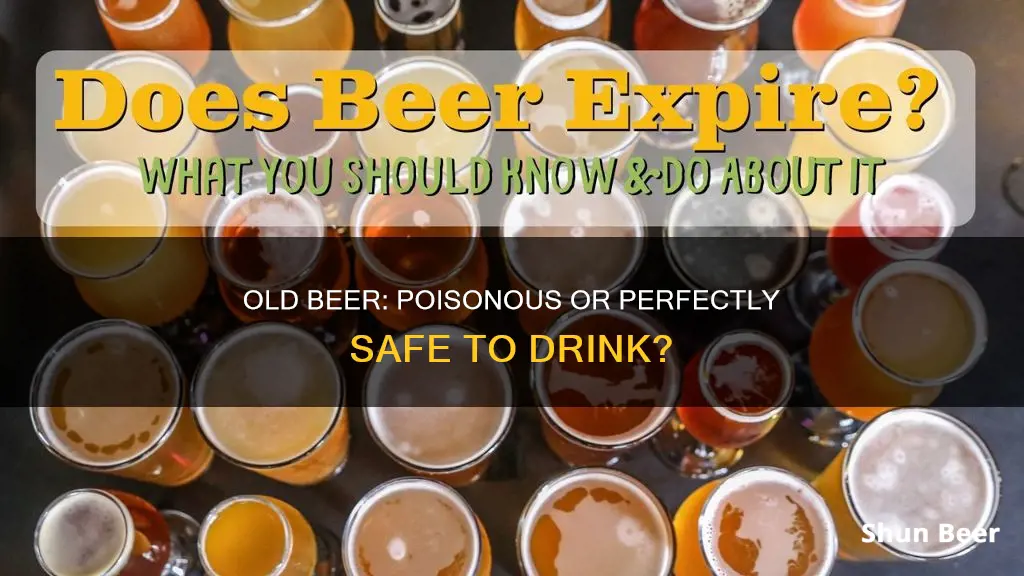
Drinking old beer will not kill you, but it might not taste very nice. Beer is a perishable product that stales when exposed to light, oxygen, and heat, which degrade the organic compounds that make beer smell and taste great. However, most beer is pasteurised or filtered to eliminate bacteria, making it extremely resistant to spoiling. The main risk is that it will taste bad.
| Characteristics | Values |
|---|---|
| Can you die from drinking old beer? | No |
| Can you get sick from drinking old beer? | No, but it may taste bad |
| How does beer taste after its "best-by" date? | Flatter, sweeter, stale, like wet cardboard |
| How long does beer last? | Refrigerated low-gravity beers can last for 6 months or more |
| What factors affect how long beer lasts? | Alcohol content, how it's stored (refrigerated beer lasts longer), the colour of the bottle (brown bottles filter out damaging light) |
What You'll Learn
- Drinking old beer is generally safe, but it may taste bad
- Old beer is unlikely to be harmful, but it may have a very different flavour profile to fresh beer
- Beer is a hostile growth environment for microorganisms, so it's safe to drink even after its 'best before' date
- Beer that has become contaminated will likely explode before you open it
- Contaminated beer may be poisonous and cause health issues like diarrhoea and muscle pain

Drinking old beer is generally safe, but it may taste bad
The "best-by" date on a beer is not an "unsafe-after" date but the brewer's estimate of how long the beer will retain its intended flavour. Beer consumed after this date may taste flatter and sweeter. The speed of flavour degradation depends on the alcohol content of the beer and how it is stored, with higher alcohol content by volume and refrigeration both slowing the process of ageing.
While drinking old beer is generally safe, there is still a small chance of adverse effects. One person who drank expired beer reported feeling dizzy and puking, while another mentioned experiencing texture issues from settling yeast, which made them gassy. However, these cases are rare, and most people who consume old beer do not report any negative consequences beyond unpleasant taste.
Beer Benefits for Hair: A Guide
You may want to see also

Old beer is unlikely to be harmful, but it may have a very different flavour profile to fresh beer
The "best-by" date is thus not "unsafe-after" but in fact what it says. Some of the less stable flavour compounds break down over time. The date printed on it is the brewery's guess as to how long they're willing to vouch for the flavour. Hot storage temperatures will speed up degradation. Beer consumed after the "best by" date (often located on the side of the label) tastes flatter and more sweet.
The explanation for why beer goes bad is twofold. First, all beer contains a minute amount of oxygen, and as the aroma and flavour compounds found in hops oxidise over time, those compounds dissipate. (Conversely, certain aromatic compounds increase with prolonged exposure to oxygen, resulting in sweet, sherry-like flavours.) Second, the speed of these reactions depends on the alcohol content of the beer and how it’s stored. Refrigerating beer slows the process of ageing, so always choose beer that is in the cooler, not on the shelf. Beers with more alcohol by volume have a longer shelf life.
To enjoy beer at its finest, buy it cold, store it in the fridge, and consume it within three to six months of packaging, or before their best-by date.
Skydiving Soon? Pre-Flight Beer: Yay or Nay?
You may want to see also

Beer is a hostile growth environment for microorganisms, so it's safe to drink even after its 'best before' date
Beer is a hostile growth environment for microorganisms, so it's safe to drink even after its best-before date. Beer has a high ethanol content, low pH, nearly anaerobic atmosphere due to the high concentration of CO2, and a limited supply of nutrients. These factors make it difficult for microorganisms to survive and proliferate, but some have adapted to this environment and can cause spoilage.
Obligate beer spoilers, which always cause spoilage, include Lactobacillus, Pediococcus, and Brettanomyces bruxellensis. Lactobacillus is often hop-resistant and can cause beer to taste sour due to the lactic acid it produces, while Pediococcus can form beta-glucans, resulting in a viscous beer with a buttery taste. Brettanomyces bruxellensis can create excess phenolic compounds and carboxylic acids, leading to a "musty" aroma and a "horsey" off-flavor.
Other microorganisms that can cause spoilage include Zymomonas, Pectinatus, Megasphaera, and Enterobacteriaceae. Zymomonas and Enterobacteriaceae are considered wort spoilers rather than beer spoilers due to their sensitivity to high alcohol and pH levels in beer. However, they can indirectly affect the flavor profile of the beer by thriving on wort nutrients.
To minimize the risk of spoilage, brewers should implement regular microbial detection throughout the brewing process and maintain healthy environments for desirable microorganisms while preventing the growth of undesirable ones. Prophylactic practices, flash pasteurization, sterile filtration, and the use of compounds like Nisin can help prevent contamination and inhibit the growth of spoilage microorganisms.
Drinking Non-Alcoholic Beer: Is It Safe to Drive?
You may want to see also

Beer that has become contaminated will likely explode before you open it
Beer is a perishable product that can go stale when exposed to light, oxygen, and heat, which degrade the organic compounds that make beer smell and taste great. However, even when its flavour is declining, it can be perfectly safe to drink. This is because most beer is either pasteurised or filtered to eliminate bacteria, making it extremely resistant to spoiling.
Contaminated beer will likely be flat, with a malty, sweet, or sherry-like taste. It may also have a skunky smell if it has been exposed to too much light. Contaminated beer may also be subject to excess carbonation, which could cause the bottle to explode before it is opened. However, this is unlikely to cause any harm, as there are no known toxic microorganisms that can survive in beer.
Beer and Ulcerative Colitis: What's the Verdict?
You may want to see also

Contaminated beer may be poisonous and cause health issues like diarrhoea and muscle pain
Beer is a perishable product that can go stale over time. However, it is resistant to spoiling and has a low pH, making it difficult for pathogens to survive in it. While old beer may be safe to consume, its flavour and quality will likely degrade, resulting in a less enjoyable drinking experience.
Contaminated beer, on the other hand, poses a serious health risk. In 2015, an incident in Mozambique resulted in 69 deaths and 196 hospitalisations after consuming contaminated traditional beer. The victims experienced symptoms such as diarrhoea and muscle pain. The source of contamination was suspected to be crocodile bile, although the true toxicity of crocodile bile is still uncertain.
Therefore, while drinking old beer is unlikely to cause severe health issues, consuming contaminated beer can be life-threatening. It is essential to be cautious and aware of the potential risks associated with drinking beer, especially when it comes to contamination. Always check for any signs of tampering or unusual odours before consumption.
Pregnant Women and Bundaberg Ginger Beer: Is It Safe?
You may want to see also
Frequently asked questions
Drinking old beer is unlikely to be harmful to your health, but it may taste unpleasant. Beer is a hostile growth environment for microorganisms, and most beer is pasteurized or filtered to eliminate bacteria, making it extremely resistant to spoiling.
Old beer will lose its bright hops flavor and refreshing bitterness, becoming flatter, sweeter, and more malty.
Beer is best enjoyed within three to six months of packaging, or before the best-by date.







